Why?
May 23rd 2007. The number of humans inhabiting cities outstripped those who didn't live in cities. At the same time larger percentages of the globe are owned by fewer and wealthier people.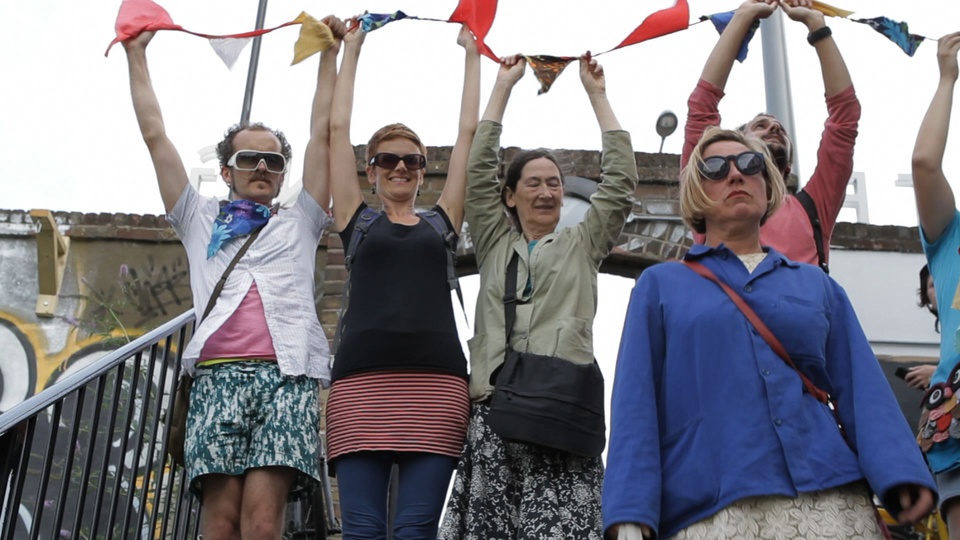 Is there still a place for us, I’ll call us “ordinary people”, in an increasingly expensive and corporate city like London today? Can we stop ourselves being cleaned up and swept away to be replaced by some perverse new build parody of a “village”? a dance film mightn’t be able to meet all of these challenges but it can bleedin well try.
Is there still a place for us, I’ll call us “ordinary people”, in an increasingly expensive and corporate city like London today? Can we stop ourselves being cleaned up and swept away to be replaced by some perverse new build parody of a “village”? a dance film mightn’t be able to meet all of these challenges but it can bleedin well try.
For instance: These are some of the shops and people of Broadway Market, Hackney, in east London 10 years ago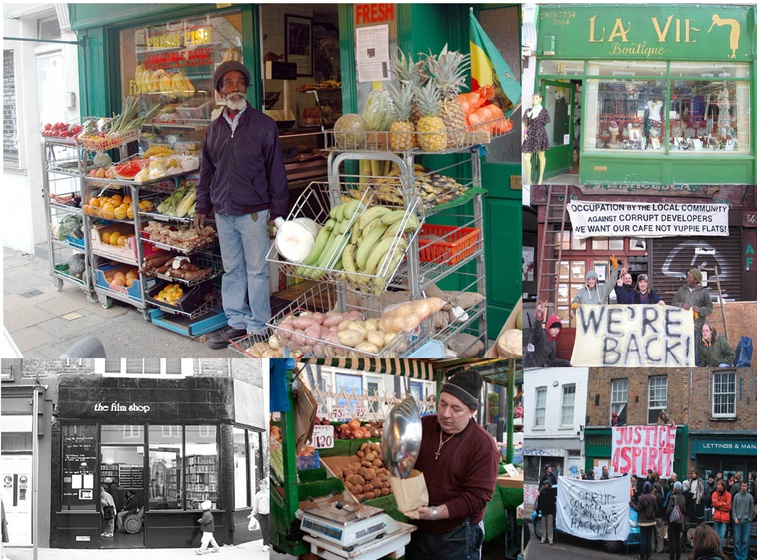 Here are the same places now
Here are the same places now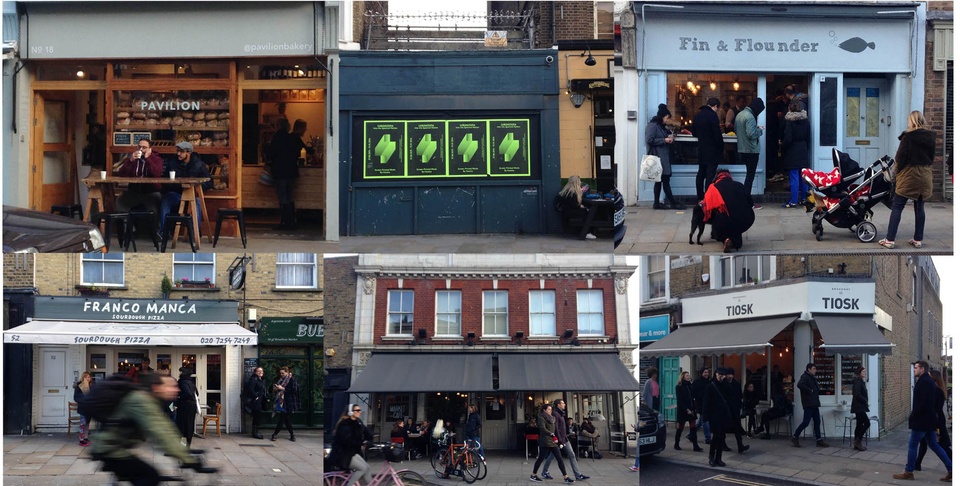 This is a film about "Solastalgia", (coined by Glenn Albrecht)
This is a film about "Solastalgia", (coined by Glenn Albrecht)
"Solastalgia is a new concept developed to give greater meaning and clarity to environmentally induced distress. As opposed to nostalgia--the melancholia or homesickness experienced by individuals when separated from a loved home--solastalgia is the distress that is produced by environmental change impacting on people while they are directly connected to their home environment."
The removal of John and Tony's Grocers' cart was a "natural change" phenomenon as John retired. Everyone else depicted left due to sharply rising rents and in the case of Spirit and Tony their businesses were sold to higher bidders by Hackney council without their having been an ample chance to pay, hence the protests also depicted. The story of Tony's cafe is well told in Emily James's documentary "The battle for Broadway market"
A PERSONAL STATEMENT BY LUCY THANE
I first started writing I AM NOT A VILLAGE about London, and most of all, Hackney, before gentrification and the dismantling of the welfare state had really started to bite through every minute of the lives of almost anyone still living here in the early 21st century who is not comfortably rich and home-owning.
It began as a celebration of what was once called (often disparagingly) "the Inner City": having grown up in socially, culturally and ethnically diverse north and east London, slowly seeing Thatcherism and Liberal then neo-Liberal tinkering dismantle and adulterate so much of what we'd called home before all our eyes. It began as a thought that great opportunities had been missed and peoples' potentials uncultivated. I lived and worked among folk creating exceptional life, language and culture in sometimes dirty and difficult circumstances, that many outside was afraid of, and many inside were desperate to escape from.
The provincial bourgeoisie that once talked in hushed tones of "dangerous Hackney" has now, encouraged by property and construction de-regulation and the selling and non-replacing of social housing stock, decided to colonise this part of east London, and to price and to bore the rest of us out, bringing their fear and prejudices with them. There is no doubt that Hackney really needed to change, the local government neglect and corruption were legendary and it’s people treated as worthless. But there seems little respect for the innovative, duckydivey poetic, yes sometimes downright bad acts of survival, creativity and community that also sprung up in the cracks between the disrupted and disputed benefit payments. We, Urban folk, are being cleaned up and swept away to who knows where to be replaced by some perverse new build parody of that homogenous "ideal" “the village”. What do we do?
I AM NOT A VILLAGE is a search for a human scale, natural, collective, wild, liveable way to live with all the cultural and social complexity, acts of kindness, mistakes, prejudices, accidents, pleasures and surprises that cities, in particular, can potentially provide. A London proud of it’s immigrants and refugees and aware of it’s complicity in making folk need to flee or migrate; a London grateful for the messy various creative ways its numerous incomers have transformed it. A London that doesn't need to be over-regulated or policed in order to live well together. A London that preserves it’s wilderness, a London that knows that the earth is still beneath the concrete, human hearts behind the suits and fluorescent clothing.
And, as more and more of us throughout the world are herded into cities this search will take us all over this world, perhaps to as many places that Londoners (particularly in Hackney) have long emigrated or fled from. This search may even take us away from cities altogether, to the many alternative communities and ways of living developing around the world as the mainstream rejects us.
Richard Sennett "The everyday disorders of modern life are a way for people to become more adult. The problem of modern cities is that there is too much order, too much regulation. It prohibits us as urbanites from learning to manage complexities"
We do not cease to be nature just because we are so frequently clothed and staring into screens. Can we find anything equal to oceans, fields, mountains, orca, eagle, elk in our personas and behaviours on city streets, shops, nightclubs and parks or must we accept an ever accelerating inferior reality hiding fearfully from "real" reality? Can a healthy and sustainable future be found within what we have learned from city-life using itself and its inhabitants as a guide? Everything originates and also contains within it it's own self-destruction. Is life inevitably always sometimes messy, chaotic, unhealthy and violent? Many behaviours and conditions that would seem intolerable elsewhere seem normal in urban contexts.
I have a basic belief that we as humans can be judged by what we find strange. Who we are is signified continually by our actions and even the smallest actions are significant in that there will be some kind of impact, even if we do not immediately or ever see the results. We live neither in vacuums or on singly inhabited islands (most of us anyway). If we increasingly urbanised humans don't start caring more about the stranger we are too and how we care for the strangers with whom we co-exist we are surely lost- can security surveilled gated communities hiding from gang wars or other disenfranchised expressions of despair be our best possible future. Brazil without samba? Individuality is too often confused with selfishness. A true individuality must encompass a sensitivity not to curtail the freedom of the other, just as it is a stupid snake that eats it's own tail. Every man, woman or child loathed, despised, ignored and not perceived for the individual he/she is will feel it and the repercussions will depend on what else is supporting or not supporting him/ her in his/ her life. Strangers matter. That is Saffron Hill's story. She is a stranger and she matters. So do you.
I AM NOT A VILLAGE is also dance musical for hackney, which I also wrote (then called INSIDE I'M DANCING) to cheer myself up because I was depressed and heart-sick and one day on the tube I looked at the "apparatus" all around and wondered why we were all just sitting and standing, why not climbing the furniture, hanging upside down, why not singing and dancing in the course of daily life?
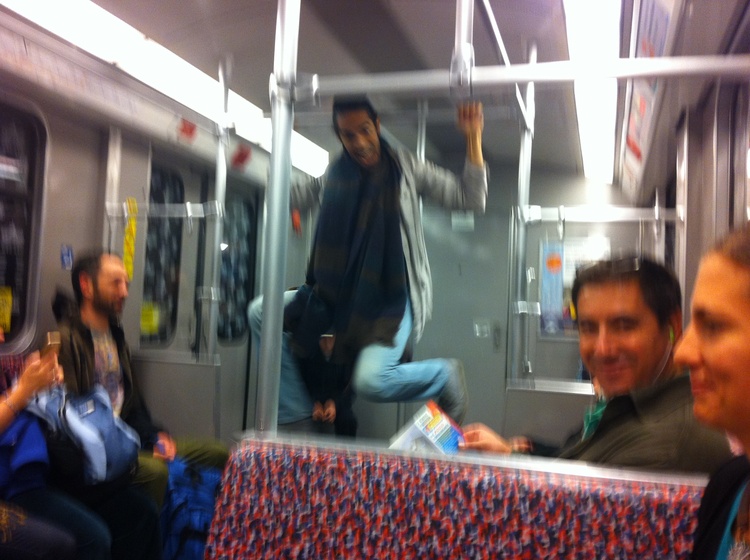
A celebration that doesn’t try to mask harsh realites, but also explores different ways of responding to the current situation. How can we portray how so many different individuals and communities have long co-existed and often thrived together without being saccharine, white-washing, stereotyping?
Sometimes I fear that we are telling a story that is already History, but am soon reminded that I am still here, many "ordinary" folk are still here and how are we to live through or defeat this time that seems to want to defeat "us". And who is "us"? We are weaving the narrative of I AM NOT A VILLAGE through daily life, protests and spectacles in part to answer this question. This is also one reason why we are requesting, often naturally eliciting, participation and footage from passersby as well as gathering a core crew and performers and are meeting regularly to work together in the studio and on location.
YOU ARE WELCOME TO JOIN US!
In addition to this being very specifically about the past, present and future of Hackney, and of London in General. Over half the world’s population now live in cities and the issues, and any solutions we might find have the power to affect us all.
I am our eyes looking away on the escalator. I go to work quite tired. I could try to quell my fears. I grow my own food. I am looking for a place to think. I am dirt I am the sewers. I am plastic, concrete and foam. I am nucleur energy. I am a drink of water. I am a cup of coffee. I am another cup of coffee. I am coming to your town soon.
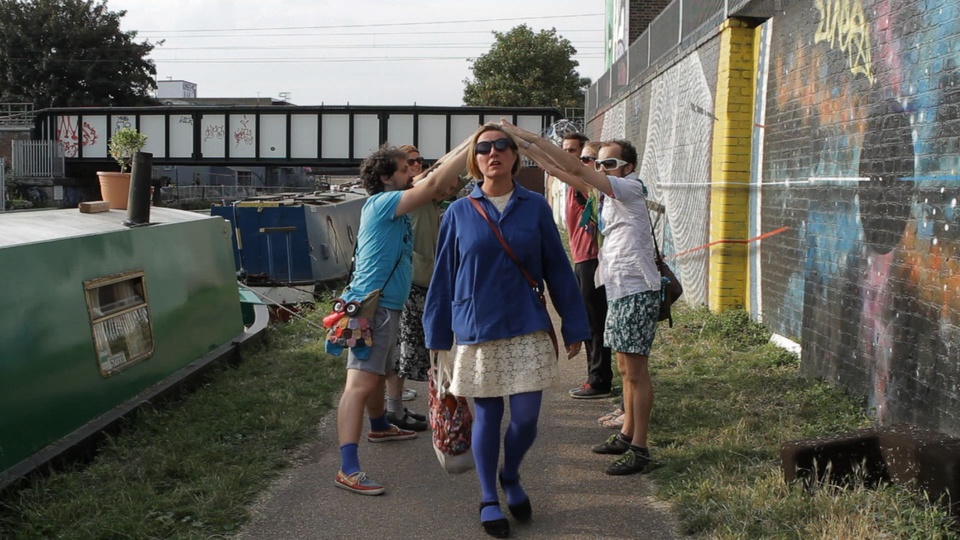
"There's no such thing as strangers, just friends you haven't met yet"
(W.B. Yeats and read by me in Irish Whiskey ad on London tube station many years ago
I have been collecting links and trying to interact with others looking at and living these issues:
http://samkriss.wordpress.com/2014/12/15/a-visit-to-the-cereal-cafe/
http://www.nottelevision.net/time-to-fight-back-six-ways-to-defend-london-culture-from-property-development/
http://drownedinsound.com/in_depth/4148568-are-beardos-to-blame-for-the-demise-of-the-uks-small-venues
http://girlwiththafro.com/2014/12/07/all-the-rich-white-folk-in-brixton-and-peckham-on-gentrification/
http://www.theguardian.com/commentisfree/2014/dec/22/behind-the-restaurant-boom-urban-delusion
Meanwhile, town halls parched for investment scrabble after restaurateurs and their cash. “Every council has its own approach to regeneration, and food is a cornerstone of our strategy,” says Andrew Sissons, regeneration guru for Hackney, in east London.
https://johnnyvoid.wordpress.com/2015/02/01/aylesbury-estate-occupied-after-yesterdays-housing-march/
http://www.newleftproject.org/index.php/site/series/the_contemporary_city
http//www.fightfortheaylesbury.wordpress.com
https://www.facebook.com/pages/Focus-E15-Mothers/602860129757343
New Era Estate (https://www.facebook.com/neweraestatetenants) (https://www.facebook.com/pages/Our-West-Hendon/1476545849228072)
http://www.theguardian.com/artanddesign/2015/feb/03/public-art-paolozzi-mosaic-tottenham-court-road
http://hackneycitizen.co.uk/2015/02/06/squatters-take-over-building-grade-ii-listed-mothers-square/
http://www.brixtonblog.com/tenants-told-to-vacate-under-plans-to-redevelop-arches-on-atlantic-road/27670
http://www.theguardian.com/artanddesign/2014/dec/16/renzo-martens-gentrify-the-jungle-congo-chocolate-art
http://www.eastbayexpress.com/oakland/artists-create-two-way-video-portal-for-oaklanders-to-meet-their-neighbors/Content?oid=4178751
http://www.thestage.co.uk/news/2015/02/simon-stephens-warns-london-expensive-artists/
http://www.theguardian.com/commentisfree/2015/feb/06/death-bohemian-london-12-bar-club-squatters
http://www.theguardian.com/commentisfree/2015/feb/03/britain-economic-crisis-public
foodbanks
http://www.theguardian.com/artanddesign/2014/oct/20/serpentine-extinction-marathon-yoko-ono-gilbert-george
www.theguardian.com/housing-network/2015/feb/06/housing-protesters-finding-voice
http://www.theguardian.com/commentisfree/2015/feb/04/stop-tories-london-super-rich-affordable-housing?CMP=share_btn_fb
http://www.independent.co.uk/news/uk/home-news/the-tragic-tale-of-the-pensioner-who-killed-himself-after-begging-for-help-over-benefit-cuts-10029754.html
http://www.livetravelenjoy.com/a-city-where-everyone-works-there-is-no-police-and-the-salary-is-1200-euros/
http://www.theguardian.com/world/2015/feb/07/climate-change-marchers-private-security-protest-police
http://www.citymetric.com/skylines/story-haggerston-estate-story-social-housing-britain-734
http://www.lrb.co.uk/v36/n01/james-meek/where-will-we-live
http://www.iamhere.org.uk/
http://www.newleftproject.org/index.php/site/article_comments/london_renters_and_the_right_to_the_city
http://hackneyrenters.org/deposits-fees-repairs/
https://www.youtube.com/watch?v=QtdqgNg1q60
https://letdownblog.wordpress.com/2013/11/16/renters-occupy-luxury-flat-development/
Handbook for the citydweller
http://abahlali.org/
http://www.newleftproject.org/index.php/site/article_comments/self_build_housing_in_a_time_of_austerity
https://www.gov.uk/government/speeches/speech-on-the-big-society
http://www.habitatforhumanity.org.uk/http://www.plannersnetwork.org/
http://www.newleftproject.org/index.php/site/article_comments/the_temporary_home_live_in_guardians_in_the_neoliberal_city
In the Netherlands, property guardianship is called ‘anti-squatting’: live-in guardian schemes are presented as both an alternative to squatting (or ‘legal squatting’) and as an active deterrent to residential and commercial squatting. In fact, in its Dutch birthplace the growth of property guardianship and the recent criminalisation of squatting are inextricably linked, as the mechanism was promoted in the guidance to the anti-squatting law itself. With the recent criminalisation of squatting in residential properties in England in 2012, a worrying trend seems to be developing.[6]
http://bondprecairewoonvormen.nl/
Housing and work flexibility have become the ‘new normal’ and the mechanism of guardianship epitomises this increasing precariousness, other symptoms of which include the widespread use of zero-hour contracts and a turn to increasingly punitive forms of workfare.
http://www.newleftproject.org/index.php/site/article_comments/inner_city_colonies_memory_power_and_identity
"Recolonization" and Public Housing: A Toronto Case Study
http://www.newleftproject.org/index.php/site/article_comments/a_compulsory_purchase_for_london
http://www.lrb.co.uk/blog/2011/08/09/james-meek/in-broadway-market/
“Bring on your exceptions. Bring them on by the thousand, by the ten thousand. But the truth holds: this is not the mixing city its liberal inhabitants would like to think it is. Loving the cultural diversity of London as a spectator-inhabitant is not the same as mingling with it. The yuppies don’t go to the white working-class pubs, and the white working class don’t go to the yuppie pubs. The Muslims don’t go to the pub at all and the post-Christians don’t go to the mosque or the church. The young don’t mix with the old. You don’t marry outside your income and education group. Parents segregate their school-age children by class and race.”
I am genuinely afraid that we might be devolving, retreating back into families, nationalities and religions, just as things have the potential to get even more interesting. Nostalgia for feudal rurality needs to be replaced by acceptance and glorification of the fact that we are hybrid civilized nature.
Places that are leaving or have left us or being transformed into rich havens:
Buffalo Bar
Heygate Estate
Spirits Nutritious Food Galley
Tony’s café
Astoria
Madame Jojos
Joiners Arms
Balfron Tower
Denmark street
Maurice Blanchot “The ultimate disaster is not to notice that a disaster has taken place”
“How will you go about finding that thing the nature of which is totally unknown to you?” Rebecca Solnit, Wanderlust
“We try of course, Many millions of people around the world are engaged in movements for eceonomic justice, peace, equality, and environmental reclamation, and these movements are often incubators for the solidarity and celebration so missing in our usual state of passive aquiescence. Yet there appears to be no constituency for collective joy itself. In fact, the very term collective joy is largely unfamiliar and exotic” (Barbara Ehrenreich)
“To be modern is to find ourselves in an environment that promises us adventure, power, joy, growth, transformation of ourselves and the world- at the same time, that threatens to destroy everything we have, everything we know, everything we are” (Marshall Berman)
Miranda July “I fear that if I get too lost in my own version of life, then I’m going to miss something –like, something pretty big.. and it’s so easy not to. All you have to do is talk to someone you don’t know-ideally out of your world- and suddenly you’re faced with, “oh right, this life I’m living? This is just one story that I tell myself again and again, but it’s surrounded by all of these simultaneous stories And that;s kind of the best feeling. I mean, it’s hard to hold that in your head for very long at a time, but it’s worth trying. Again and again.”
Barbara Ehrenreich
“The family is all we need, America’s ostensibly Christian evangelicists tell us- a fit container for all our social loyalties and yearnings. But if anything represents a kind of evolutionary regression it it this. Insofar as we compress our sociality into the limits of the family, we do not so much resemble our palielithic human ancestors as we do those far earlier prehuman primates who had not yet discovered the danced ritual as a “biotechnology” for the formation of larger groups. Humans had the wit and generosity to reach out to unrelated others; hominids huddled with their kin”

For instance: These are some of the shops and people of Broadway Market, Hackney, in east London 10 years ago


"Solastalgia is a new concept developed to give greater meaning and clarity to environmentally induced distress. As opposed to nostalgia--the melancholia or homesickness experienced by individuals when separated from a loved home--solastalgia is the distress that is produced by environmental change impacting on people while they are directly connected to their home environment."
The removal of John and Tony's Grocers' cart was a "natural change" phenomenon as John retired. Everyone else depicted left due to sharply rising rents and in the case of Spirit and Tony their businesses were sold to higher bidders by Hackney council without their having been an ample chance to pay, hence the protests also depicted. The story of Tony's cafe is well told in Emily James's documentary "The battle for Broadway market"
A PERSONAL STATEMENT BY LUCY THANE
I first started writing I AM NOT A VILLAGE about London, and most of all, Hackney, before gentrification and the dismantling of the welfare state had really started to bite through every minute of the lives of almost anyone still living here in the early 21st century who is not comfortably rich and home-owning.
It began as a celebration of what was once called (often disparagingly) "the Inner City": having grown up in socially, culturally and ethnically diverse north and east London, slowly seeing Thatcherism and Liberal then neo-Liberal tinkering dismantle and adulterate so much of what we'd called home before all our eyes. It began as a thought that great opportunities had been missed and peoples' potentials uncultivated. I lived and worked among folk creating exceptional life, language and culture in sometimes dirty and difficult circumstances, that many outside was afraid of, and many inside were desperate to escape from.
The provincial bourgeoisie that once talked in hushed tones of "dangerous Hackney" has now, encouraged by property and construction de-regulation and the selling and non-replacing of social housing stock, decided to colonise this part of east London, and to price and to bore the rest of us out, bringing their fear and prejudices with them. There is no doubt that Hackney really needed to change, the local government neglect and corruption were legendary and it’s people treated as worthless. But there seems little respect for the innovative, duckydivey poetic, yes sometimes downright bad acts of survival, creativity and community that also sprung up in the cracks between the disrupted and disputed benefit payments. We, Urban folk, are being cleaned up and swept away to who knows where to be replaced by some perverse new build parody of that homogenous "ideal" “the village”. What do we do?
I AM NOT A VILLAGE is a search for a human scale, natural, collective, wild, liveable way to live with all the cultural and social complexity, acts of kindness, mistakes, prejudices, accidents, pleasures and surprises that cities, in particular, can potentially provide. A London proud of it’s immigrants and refugees and aware of it’s complicity in making folk need to flee or migrate; a London grateful for the messy various creative ways its numerous incomers have transformed it. A London that doesn't need to be over-regulated or policed in order to live well together. A London that preserves it’s wilderness, a London that knows that the earth is still beneath the concrete, human hearts behind the suits and fluorescent clothing.
And, as more and more of us throughout the world are herded into cities this search will take us all over this world, perhaps to as many places that Londoners (particularly in Hackney) have long emigrated or fled from. This search may even take us away from cities altogether, to the many alternative communities and ways of living developing around the world as the mainstream rejects us.
Richard Sennett "The everyday disorders of modern life are a way for people to become more adult. The problem of modern cities is that there is too much order, too much regulation. It prohibits us as urbanites from learning to manage complexities"
We do not cease to be nature just because we are so frequently clothed and staring into screens. Can we find anything equal to oceans, fields, mountains, orca, eagle, elk in our personas and behaviours on city streets, shops, nightclubs and parks or must we accept an ever accelerating inferior reality hiding fearfully from "real" reality? Can a healthy and sustainable future be found within what we have learned from city-life using itself and its inhabitants as a guide? Everything originates and also contains within it it's own self-destruction. Is life inevitably always sometimes messy, chaotic, unhealthy and violent? Many behaviours and conditions that would seem intolerable elsewhere seem normal in urban contexts.
I have a basic belief that we as humans can be judged by what we find strange. Who we are is signified continually by our actions and even the smallest actions are significant in that there will be some kind of impact, even if we do not immediately or ever see the results. We live neither in vacuums or on singly inhabited islands (most of us anyway). If we increasingly urbanised humans don't start caring more about the stranger we are too and how we care for the strangers with whom we co-exist we are surely lost- can security surveilled gated communities hiding from gang wars or other disenfranchised expressions of despair be our best possible future. Brazil without samba? Individuality is too often confused with selfishness. A true individuality must encompass a sensitivity not to curtail the freedom of the other, just as it is a stupid snake that eats it's own tail. Every man, woman or child loathed, despised, ignored and not perceived for the individual he/she is will feel it and the repercussions will depend on what else is supporting or not supporting him/ her in his/ her life. Strangers matter. That is Saffron Hill's story. She is a stranger and she matters. So do you.
I AM NOT A VILLAGE is also dance musical for hackney, which I also wrote (then called INSIDE I'M DANCING) to cheer myself up because I was depressed and heart-sick and one day on the tube I looked at the "apparatus" all around and wondered why we were all just sitting and standing, why not climbing the furniture, hanging upside down, why not singing and dancing in the course of daily life?

A celebration that doesn’t try to mask harsh realites, but also explores different ways of responding to the current situation. How can we portray how so many different individuals and communities have long co-existed and often thrived together without being saccharine, white-washing, stereotyping?
Sometimes I fear that we are telling a story that is already History, but am soon reminded that I am still here, many "ordinary" folk are still here and how are we to live through or defeat this time that seems to want to defeat "us". And who is "us"? We are weaving the narrative of I AM NOT A VILLAGE through daily life, protests and spectacles in part to answer this question. This is also one reason why we are requesting, often naturally eliciting, participation and footage from passersby as well as gathering a core crew and performers and are meeting regularly to work together in the studio and on location.
YOU ARE WELCOME TO JOIN US!
In addition to this being very specifically about the past, present and future of Hackney, and of London in General. Over half the world’s population now live in cities and the issues, and any solutions we might find have the power to affect us all.
I am our eyes looking away on the escalator. I go to work quite tired. I could try to quell my fears. I grow my own food. I am looking for a place to think. I am dirt I am the sewers. I am plastic, concrete and foam. I am nucleur energy. I am a drink of water. I am a cup of coffee. I am another cup of coffee. I am coming to your town soon.

"There's no such thing as strangers, just friends you haven't met yet"
(W.B. Yeats and read by me in Irish Whiskey ad on London tube station many years ago
I have been collecting links and trying to interact with others looking at and living these issues:
http://samkriss.wordpress.com/2014/12/15/a-visit-to-the-cereal-cafe/
http://www.nottelevision.net/time-to-fight-back-six-ways-to-defend-london-culture-from-property-development/
http://drownedinsound.com/in_depth/4148568-are-beardos-to-blame-for-the-demise-of-the-uks-small-venues
http://girlwiththafro.com/2014/12/07/all-the-rich-white-folk-in-brixton-and-peckham-on-gentrification/
http://www.theguardian.com/commentisfree/2014/dec/22/behind-the-restaurant-boom-urban-delusion
Meanwhile, town halls parched for investment scrabble after restaurateurs and their cash. “Every council has its own approach to regeneration, and food is a cornerstone of our strategy,” says Andrew Sissons, regeneration guru for Hackney, in east London.
https://johnnyvoid.wordpress.com/2015/02/01/aylesbury-estate-occupied-after-yesterdays-housing-march/
http://www.newleftproject.org/index.php/site/series/the_contemporary_city
http//www.fightfortheaylesbury.wordpress.com
https://www.facebook.com/pages/Focus-E15-Mothers/602860129757343
New Era Estate (https://www.facebook.com/neweraestatetenants) (https://www.facebook.com/pages/Our-West-Hendon/1476545849228072)
http://www.theguardian.com/artanddesign/2015/feb/03/public-art-paolozzi-mosaic-tottenham-court-road
http://hackneycitizen.co.uk/2015/02/06/squatters-take-over-building-grade-ii-listed-mothers-square/
http://www.brixtonblog.com/tenants-told-to-vacate-under-plans-to-redevelop-arches-on-atlantic-road/27670
http://www.theguardian.com/artanddesign/2014/dec/16/renzo-martens-gentrify-the-jungle-congo-chocolate-art
http://www.eastbayexpress.com/oakland/artists-create-two-way-video-portal-for-oaklanders-to-meet-their-neighbors/Content?oid=4178751
http://www.thestage.co.uk/news/2015/02/simon-stephens-warns-london-expensive-artists/
http://www.theguardian.com/commentisfree/2015/feb/06/death-bohemian-london-12-bar-club-squatters
http://www.theguardian.com/commentisfree/2015/feb/03/britain-economic-crisis-public
foodbanks
http://www.theguardian.com/artanddesign/2014/oct/20/serpentine-extinction-marathon-yoko-ono-gilbert-george
www.theguardian.com/housing-network/2015/feb/06/housing-protesters-finding-voice
http://www.theguardian.com/commentisfree/2015/feb/04/stop-tories-london-super-rich-affordable-housing?CMP=share_btn_fb
http://www.independent.co.uk/news/uk/home-news/the-tragic-tale-of-the-pensioner-who-killed-himself-after-begging-for-help-over-benefit-cuts-10029754.html
http://www.livetravelenjoy.com/a-city-where-everyone-works-there-is-no-police-and-the-salary-is-1200-euros/
http://www.theguardian.com/world/2015/feb/07/climate-change-marchers-private-security-protest-police
http://www.citymetric.com/skylines/story-haggerston-estate-story-social-housing-britain-734
http://www.lrb.co.uk/v36/n01/james-meek/where-will-we-live
http://www.iamhere.org.uk/
http://www.newleftproject.org/index.php/site/article_comments/london_renters_and_the_right_to_the_city
http://hackneyrenters.org/deposits-fees-repairs/
https://www.youtube.com/watch?v=QtdqgNg1q60
https://letdownblog.wordpress.com/2013/11/16/renters-occupy-luxury-flat-development/
Handbook for the citydweller
http://abahlali.org/
http://www.newleftproject.org/index.php/site/article_comments/self_build_housing_in_a_time_of_austerity
https://www.gov.uk/government/speeches/speech-on-the-big-society
http://www.habitatforhumanity.org.uk/http://www.plannersnetwork.org/
http://www.newleftproject.org/index.php/site/article_comments/the_temporary_home_live_in_guardians_in_the_neoliberal_city
In the Netherlands, property guardianship is called ‘anti-squatting’: live-in guardian schemes are presented as both an alternative to squatting (or ‘legal squatting’) and as an active deterrent to residential and commercial squatting. In fact, in its Dutch birthplace the growth of property guardianship and the recent criminalisation of squatting are inextricably linked, as the mechanism was promoted in the guidance to the anti-squatting law itself. With the recent criminalisation of squatting in residential properties in England in 2012, a worrying trend seems to be developing.[6]
http://bondprecairewoonvormen.nl/
Housing and work flexibility have become the ‘new normal’ and the mechanism of guardianship epitomises this increasing precariousness, other symptoms of which include the widespread use of zero-hour contracts and a turn to increasingly punitive forms of workfare.
http://www.newleftproject.org/index.php/site/article_comments/inner_city_colonies_memory_power_and_identity
"Recolonization" and Public Housing: A Toronto Case Study
http://www.newleftproject.org/index.php/site/article_comments/a_compulsory_purchase_for_london
http://www.lrb.co.uk/blog/2011/08/09/james-meek/in-broadway-market/
“Bring on your exceptions. Bring them on by the thousand, by the ten thousand. But the truth holds: this is not the mixing city its liberal inhabitants would like to think it is. Loving the cultural diversity of London as a spectator-inhabitant is not the same as mingling with it. The yuppies don’t go to the white working-class pubs, and the white working class don’t go to the yuppie pubs. The Muslims don’t go to the pub at all and the post-Christians don’t go to the mosque or the church. The young don’t mix with the old. You don’t marry outside your income and education group. Parents segregate their school-age children by class and race.”
I am genuinely afraid that we might be devolving, retreating back into families, nationalities and religions, just as things have the potential to get even more interesting. Nostalgia for feudal rurality needs to be replaced by acceptance and glorification of the fact that we are hybrid civilized nature.
Places that are leaving or have left us or being transformed into rich havens:
Buffalo Bar
Heygate Estate
Spirits Nutritious Food Galley
Tony’s café
Astoria
Madame Jojos
Joiners Arms
Balfron Tower
Denmark street
Maurice Blanchot “The ultimate disaster is not to notice that a disaster has taken place”
“How will you go about finding that thing the nature of which is totally unknown to you?” Rebecca Solnit, Wanderlust
“We try of course, Many millions of people around the world are engaged in movements for eceonomic justice, peace, equality, and environmental reclamation, and these movements are often incubators for the solidarity and celebration so missing in our usual state of passive aquiescence. Yet there appears to be no constituency for collective joy itself. In fact, the very term collective joy is largely unfamiliar and exotic” (Barbara Ehrenreich)
“To be modern is to find ourselves in an environment that promises us adventure, power, joy, growth, transformation of ourselves and the world- at the same time, that threatens to destroy everything we have, everything we know, everything we are” (Marshall Berman)
Miranda July “I fear that if I get too lost in my own version of life, then I’m going to miss something –like, something pretty big.. and it’s so easy not to. All you have to do is talk to someone you don’t know-ideally out of your world- and suddenly you’re faced with, “oh right, this life I’m living? This is just one story that I tell myself again and again, but it’s surrounded by all of these simultaneous stories And that;s kind of the best feeling. I mean, it’s hard to hold that in your head for very long at a time, but it’s worth trying. Again and again.”
Barbara Ehrenreich
“The family is all we need, America’s ostensibly Christian evangelicists tell us- a fit container for all our social loyalties and yearnings. But if anything represents a kind of evolutionary regression it it this. Insofar as we compress our sociality into the limits of the family, we do not so much resemble our palielithic human ancestors as we do those far earlier prehuman primates who had not yet discovered the danced ritual as a “biotechnology” for the formation of larger groups. Humans had the wit and generosity to reach out to unrelated others; hominids huddled with their kin”
